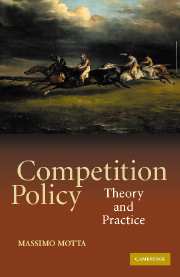Book contents
- Frontmatter
- Dedication
- Contents
- List of Figures
- List of Tables
- Preface
- Acknowledgements
- List of Abbreviations
- 1 Competition Policy: History, Objectives, and the Law
- 2 Market Power and Welfare: Introduction
- 3 Market Definition and the Assessment of Market Power
- 4 Collusion and Horizontal Agreements
- 5 Horizontal Mergers
- 6 Vertical Restraints and Vertical Mergers
- 7 Predation, Monopolisation, and Other Abusive Practices
- 8 A Toolkit: Game Theory and Imperfect Competition Models
- Bibliography
- References to Cases and Legislation
- Index
Preface
Published online by Cambridge University Press: 05 August 2015
- Frontmatter
- Dedication
- Contents
- List of Figures
- List of Tables
- Preface
- Acknowledgements
- List of Abbreviations
- 1 Competition Policy: History, Objectives, and the Law
- 2 Market Power and Welfare: Introduction
- 3 Market Definition and the Assessment of Market Power
- 4 Collusion and Horizontal Agreements
- 5 Horizontal Mergers
- 6 Vertical Restraints and Vertical Mergers
- 7 Predation, Monopolisation, and Other Abusive Practices
- 8 A Toolkit: Game Theory and Imperfect Competition Models
- Bibliography
- References to Cases and Legislation
- Index
Summary
Recently, competition policy (or anti-trust policy, as it is more often called in the US) has often made the first pages of newspapers. High-profile cases both in the European Union and in the US have attracted the attention of society at large. Among the possible examples, there are US v. Microsoft (see Chapter 7 for a discussion), where the Department of Justice at one point asked for such a drastic measure as the split of the software giant into two separate companies; a few cartel cases with an international dimension (such as those involving the producers of lysine, vitamins, or the famous auction houses Sotheby's and Christie's), that resulted in prison sentences for some of the firms' managers involved; and some EU merger cases, such as General Electric/Honeywell (see Chapter 6), which was followed by public opinion on both sides of the Atlantic (and most people were surprised when eventually the European Commission blocked the deal between the two American companies).
What Competition Policy Is and Why We Need It Rather than starting by defining competition policy in abstract terms, in the book I first provide the reader with an idea of what competition policy is about through a historical approach (see Chapter 1). Only after having briefly described competition laws in the US and in the EU, do I give a formal definition of competition policy (see Chapter 2) as “the set of policies and laws which ensure that competition in the marketplace is not restricted in such a way as to reduce economic welfare”.
In this definition two elements should be underlined. The first is that firms might restrict competition in a way which is not necessarily detrimental (for instance, this is the case for most vertical restraints, that is, restrictive clauses between a manufacturer and a retailer, see Chapter 6). The second is that economic welfare, a standard concept for economists (see Chapter 2) is the objective that competition policies should pursue.
- Type
- Chapter
- Information
- Competition PolicyTheory and Practice, pp. xvii - xxPublisher: Cambridge University PressPrint publication year: 2004



